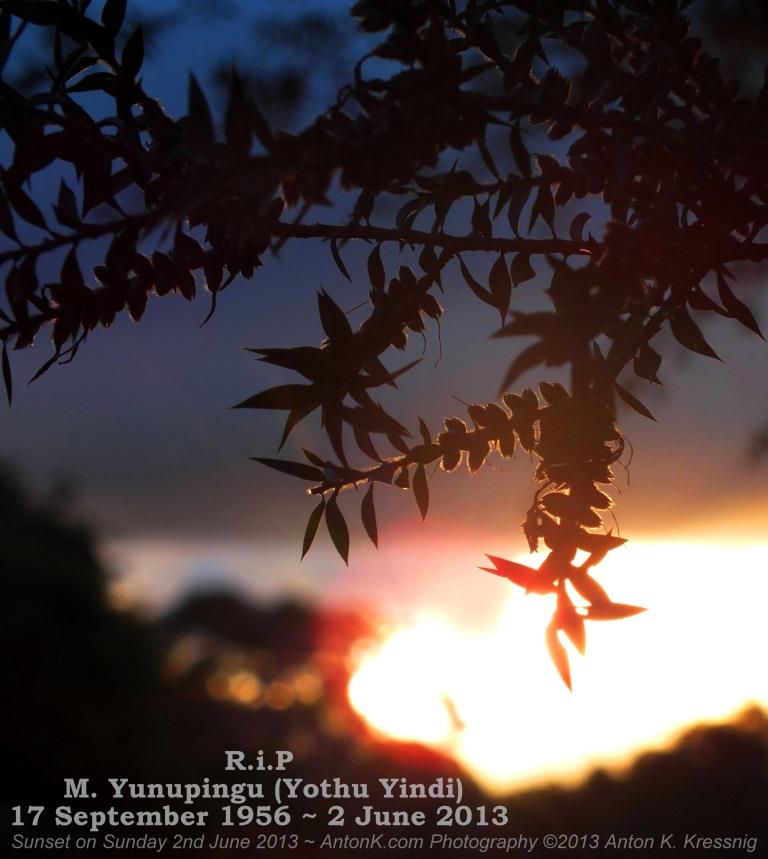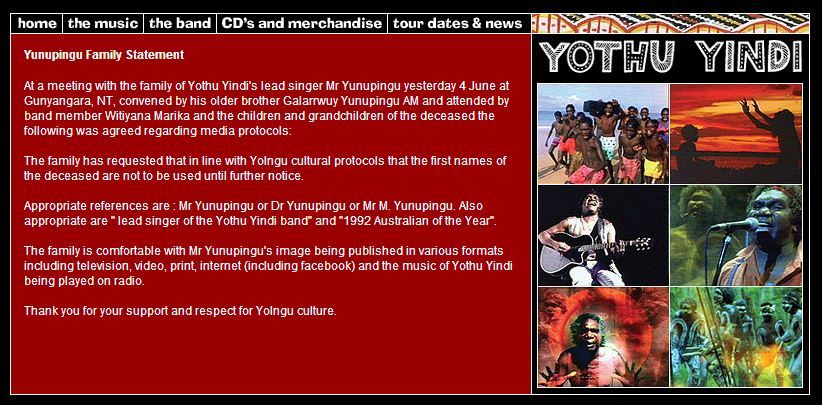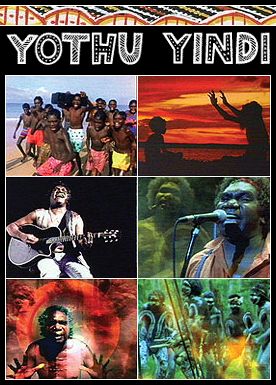
YOTHU YiNDi LEAD SiNGER M. YUNUPiNGU DiED
Note: Due to the respect for the family and Aboriginal tradition, the full name of the deceased will not be displayed during the first 12 months from the date of death. M. Yunupingu the lead singer from the great Aussie rock band YOTHU YiNDi passed away on Sunday 2nd June 2013, aged 56 years. M. Yunupingu was the 1st Aboriginal from Arnhem Land to gain a university degree, and the 1st Aboriginal principal in Australia. M. Yunupingu can rest well, because he shared his message to the world through his passion for teaching and music with Yothu Yindi, doing what he dreamed, and doing a great thing for his indigenous culture.
“We don’t own Mother Earth, the Earth owns us.” ~ M. Yunupingu

ABOUT The YOTHU YiNDi LEAD SiNGER M. YUNUPiNGU
M.Yunupingu was born on the 17th September 1956 in Yirrkala in Arnhem Land, an Aboriginal Reserve in the north eastern part of the Northern Territory. He was a member of the Gumatj people, one of 16 groups of the Yolngu people. Yunupingu‘s skin name was Gudjuk, his first name was changed to M******* when a family member with the same name died, which was in line with Yolngu custom. His first name M******* means ‘from clay’. M.Yunupingu father was Munggurrawuy Yunupingu (1907~1978), a Gumatj clan leader and artist. His mother, Makurrngu was a member of the Galpu clan, and one of Munggurrawuy‘s 12 wives. His oldest sister Gulumbu Yunupingu (1945~2012) was an artist and healer. His other sisters Nyapanyapa and Barrupu are also artists. His older brother Galarrwuy Yunupingu is a senior elder of Arnhem Land, 1978 Australian of the Year, and was an indigenous land rights campaigner. M.Yunupingu was the singer-songwriter and guitarist of the Aboriginal rock group Yothu Yindi from 1986. He helped establish the Yolngu Action Group and introduced the Both Ways system, which recognised traditional Aboriginal teaching alongside Western methods. Yunupingu became assistant principal of his former school, the Yirrkala Community School in 1989, and was principal for the following 2 years.

YOTHU YiNDi released 6 albums:
- Homeland Movement (March 1989)
- Tribal Voice (October 1991)
- Freedom(November 1993)
- Birrkuta – Wild Honey (November 1996)
- One Blood (June 1999)
- Garma (November 2000)
Yothu Yindi “Treaty” YouTube video… Yothu Yindi had 2 songs in the Top 20 ARIA Singles Chart with Treaty in 1991, and Djäpana (Sunset Dreaming in 1992. M.Yunupingu was appointed Australian of the Year for 1992 by the National Australia Day Council. In 1998 he was awarded an honorary doctorate by the Queensland University of Technology. Yothu Yindi were inducted into the ARIA Hall of Fame in 2012 . In 2007 Yunupingu was diagnosed with advanced renal failure and died on Sunday 2nd June 2013, aged 56 years. Yunupingu was married to fellow teacher, Gatjilayngu Maymuru (Yalmay) of the Rirritjingu clan, and he is survived by his 5 daughters and 5 grandsons. In May 2013 the National Indigenous Music Awards announced that Yothu Yindi were to be honoured at their awards ceremony in August, Maymuru was going to be backed by original band members. Yunupingu declared “My heart is full of joy. I am so happy to see that in my lifetime Indigenous music has come such a long way. And to have these talented artists come together to honour the groundbreaking work of Yothu Yindi makes me proud beyond words. Yo Manymak”. Yothu Yindi “Tribal Voice” YouTube video: Yothu Yindi Treaty ARIA 2012 YouTube video : Yothu Yindi were invited into the ARIA Awards 2012 Hall of Fame, and then were joined on stage by Jessica Mauboy, Paul Kelly, Andrew Farriss, Dan Sultan and Peter Garrett to perform Treaty. YOTHU YiNDi LEAD SiNGER M. YUNUPiNGU FAREWELL iN THE NEWS:
- The AGE: Emotional farewell for Yothu Yindi singer (30th June 2013) The emotional state memorial for beloved Yothu Yindi singer and indigenous educator Mr Yunupingu started and ended with dancing – the Madayin Bungul, by members of his own family, emerging from the Northern Territory bush painted yellow and white and brandishing spears to dance first the crocodile and then, finally, fire… read more
- The AGE NATiONAL: Yunupingu farewelled in bush state funeral (30th June 2013)
- The SYDNEY MORNiNG HERALD: Yunupingu farewelled in bush state funeral (30th June 2013)
- NEWS.com.au: Kevin Rudd, Peter Garrett and Adam Giles attend memorial for Yothu Yindi singer (30th June 2013) He took the plight of Aboriginal people to the world stage, mixing with celebrities and Australian leaders who all flocked to Arnhem Land yesterday to say their final farewell. Yothu Yindi frontman Mr Yunupingu’s state funeral was as much a service of thanksgiving for a man who simultaneously educated a generation of Aboriginal children while leaving the nation with indelible lessons about breaking down discrimination… read more
- The AUSTRALiAN: Colourful farewell for elder Yunupingu (30th June 2013) A TRADITIONAL dance has opened the funeral of one of Australia’s leading indigenous figures, singer Yunupingu, deep in the heart of Arnhem Land. Prime Minister Kevin Rudd, Northern Territory Chief Minister Adam Giles and singer Paul Kelly are among the mourners who have gathered in the stringybark forest of Gulkula… read more
- SBS WORLD NEWS: Yunupingu farewelled in bush state funeral (30th June 2013) Hundreds of mourners have farewelled Yothu Yindi singer, Yunupingu, at a bush state funeral in Arnhem Land. The orange headband worn by one of Australia’s leading indigenous figures, singer Dr Yunupingu, has had a final outing… read more
AVOiDANCE OF NAMiNG & SHOWiNG iMAGES OF DECEASED ABORiGiNALS: The avoidance of naming and showing images of deceased Aboriginals is practised for 12 months from the date of death (or several years in some cases). Traditionally, this meant avoiding referring to a deceased Aboriginal by name directly after their death as a mark of respect, and also because it is considered to be too painful for the grieving family. Today this practice continues in many communities, but has also come to encompass avoiding the publication or dissemination of photography and film footage of the deceased person as well. Many Australian television programs include a warning for Aboriginal and Torres Strait Islanders to use caution viewing film that may contain images or voices of dead persons, out of respect for the cultural beliefs of said viewers. The deceased person can still be referred to in a roundabout way, with a nickname or by their generic skin name, but not by first name. Read more about Australian Aboriginal avoidance practices.
YOTHU YiNDi FOUNDATiON: www.YYF.com.au
